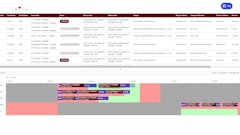
Increasingly complex food supply chains create a critical need for the food industry to collaborate across enterprises to understand and improve end-to-end processes employed throughout the chains. This requires the ability to assess the value of improving these processes, employing new technology and taking advantage of information requirements of new government regulations such as the FDA Food Safety Modernization Act.
These are not efforts that can be successfully undertaken without broad industry support. In order to initiate a cross-enterprise collaborative effort, Georgia Tech’s Integrated Food Chain Center (IFC) has worked with a broad industry board to prioritize projects that can bring the most value to the food industry in the shortest period of time.
The following two projects have been selected as the initial pilots.
Identify Risks
Track time and temperature of perishable products from producer to store:
The objective is to quantify and locate temperature risks throughout the supply chain, to identify what logistics processes put food at risk and how those risks can be ameliorated. In Phase 1 data will be gathered over the full extent of the supply chains of selected key perishables, over the course of a year, with particular attention paid to international supply chains.
Data currently being collected by industry partners will be evaluated and incorporated where possible. The processes along the supply chains of key products will be mapped and time, temperature, and location along the entire length of the chain will be captured for an extended time.
In Phase 2, to encourage participation in the project the participants will have the ability to access reports on their own time-temperature-location information. Their own information will also be benchmarked against aggregate measures (mean, median and standard deviation) of the rest of the participants.
Assessing the value per day of quality-sell-time:
The objective is to determine the value of adding additional days to the quality-sell-time of the product. Quality-sell-time is the time that the product is on the shelf available to sell at an acceptable quality. A planning tool will be developed to calculate the additional value of adding a day of quality-sell-time for any given product. This tool will consider current order replenishment policy inputs, demand patterns, and vary the shelf-life estimates to calculate inventory levels, stock-outs, and waste over time for each product and its relative shelf-life estimate.
Phase 1 will determine the technology requirements and application analytics required to allow the tool to account for detailed inputs, calculations, and decision outputs for evaluating quality-sell-time. The evaluation module will consist of two components – an inventory component and a costing component.
In Phase 2 will focus on the generation of realistic scenarios to evaluate and obtaining the necessary data to populate the technology developed in Phase 1. The first step is to assemble a group of participating grocery stores and select the products to be analyzed. Then data will be obtained from each store to allow evaluation of the value of an additional day of quality sell time for the products and scenarios of interest to the particular store. Specific store data and results will be kept confidential but general conclusions regarding the values determined will be made widely available to the food industry.
Participants Needed
IFC is in search of participants in these pilots. Participants will learn the value of having additional shelf or flavor life that comes from proper handling, transport, delivery and merchandising of selected perishable products. They will benefit from the higher level of attention, exclusive research, and one-on-one knowledge transfer that will come from direct involvement of the IFC’s pilot programs.
Participants will have direct access and are welcome to actively participate in this exclusive research aimed at optimizing product quality and maximizing sales. Most importantly, each participant will gain insights within the context of his/her own business issues.
Georgia Tech’s Supply Chain & Logistics Institute and the IFC represent is a source of fresh thinking and powerful ideas. As such, you will be working with many of the leading food manufacturers, retailers, distributors and logistics providers in the world. The ideal candidates are responsible for protecting their brands in highly competitive marketplaces with a strong need to continually differentiate on the value and quality delivered.
The IFC advantage is best suited for organizations that are market and innovation driven. Becoming a participating member of the IFC and its cold chain pilot projects have unique market power because of the combination of information about food science, technology, quality and a deep understanding of the economics pertaining to the development, production and distribution of perishable foods that suppliers, manufacturers and consumers do not and cannot have, or do not need to have due to research and experience of the IFC.
To become a member of the IFC or to participate in the cold chain pilots contact [email protected].
Pacitti is partner, Sterling Solutions LLC, Memphis and co-founding member, Integrated Food Chain (IFC) Center, Atlanta.






























